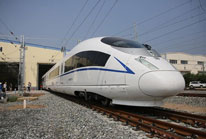

Donald Trump and Hillary Clinton, the respective Republican and Democratic nominees for U.S. president, are now deep into the election season. While a number of factors differentiate this election from previous campaigns, one aspect that remains the same is how prominently China has featured in debates and election speeches.
For instance, both nominees claimed last week in speeches about economic policy that they will be tough on trade disputes with China. However, despite this “campaign rhetoric,” previous elections have shown that such aggressive arguments about China are generally toned down once one nominee wins the election and takes office.
For instance, former President Jimmy Carter fiercely criticized human rights in China during his presidential campaign, but it was during his term as president that China-U.S. relations were normalized. After he left office, he paid further visits to China, making contributions to the friendship between the two countries.
Another former president, Bill Clinton, picked on George H. W. Bush for his "soft" policies on China during the presidential campaign, frequently challenging China on issues of human rights, intellectual property protection and more. However, China-U.S. relations also made tangible progress during Clinton’s eight years in office.
Such cases have proven that China-U.S. ties are unlikely to be affected in an extreme way no matter who the next president is. Every serving U.S. president understands that cooperation with China is in the interest of the U.S. Thus, after nearly 40 years of friendship between the two countries, China-U.S. ties are too resilient to be overturned by a single individual, even if that individual is president of the United States.
The strategic significance of China-U.S. ties requires both countries to commit to building a new model of major-country relations. As the largest developing and developed countries respectively, China and the U.S. are endowed with the task of safeguarding global peace and development. In this era of economic globalization, a confrontation between the two countries would hurt not only China and the U.S., but also many other countries.
No matter who is elected as the next U.S. president, he or she should develop China-U.S. relations based on principles of non-confrontation, mutual respect and cooperation. China became the biggest trade partner of the U.S. last year, with a trade volume of close to $560 billion. Two-way investment exceeded $150 billion. For that reason, closer cooperation based on equality and mutual benefits rather than economic warfare is the wise choice for the next president of the U.S.
In recent years, China and the U.S. have issued three joint statements regarding climate change, making great contributions to the success of the UN Climate Change Conference held in Paris. U.S. political heavyweights, including President Barack Obama, have also lauded China for its efforts throughout the Iranian nuclear issue. In these matters and more, it has been proven that China-U.S. cooperation has the potential to achieve major gains in a variety of global issues.
With different histories, development levels and social systems, there are naturally some differences between the two countries. However, one can only hope that the next president will manage these differences in a way that fosters mutual trust between the two powers. Doing so will benefit the citizens of both countries, as well as others around the globe.
This article is edited and translated from 超越华盛顿选举政治看中美关系(钟声) Source: People's Daily
 World's fastest bullet train to start operating next month
World's fastest bullet train to start operating next month Huangluo: China's 'long hair village'
Huangluo: China's 'long hair village' Spectacular bridge with one of the tallest piers in the world
Spectacular bridge with one of the tallest piers in the world Magnificent view of Hukou Waterfall
Magnificent view of Hukou Waterfall A glimpse of Stride 2016 Zhurihe B military drill
A glimpse of Stride 2016 Zhurihe B military drill US Navy chief tours Liaoning aircraft carrier
US Navy chief tours Liaoning aircraft carrier Chinese American woman wins Miss Michigan
Chinese American woman wins Miss Michigan Centenarian couple takes first wedding photos
Centenarian couple takes first wedding photos Traditional Tibetan costumes presented during fashion show
Traditional Tibetan costumes presented during fashion show Top 10 livable Chinese cities
Top 10 livable Chinese cities Top 20 hottest women in the world in 2014
Top 20 hottest women in the world in 2014 Top 10 hardest languages to learn
Top 10 hardest languages to learn China’s Top 10 Unique Bridges, Highways and Roads
China’s Top 10 Unique Bridges, Highways and Roads Pragmatism raises hope for Myitsone Dam
Pragmatism raises hope for Myitsone Dam Chinese Catholics split over cardinal’s article about China-Vatican negotiations
Chinese Catholics split over cardinal’s article about China-Vatican negotiations Helpful hacker forums close after arrest for revealing vulnerabilities
Helpful hacker forums close after arrest for revealing vulnerabilities 'Born in China' uses drama and cute animals to promote environmental message
'Born in China' uses drama and cute animals to promote environmental messageDay|Week